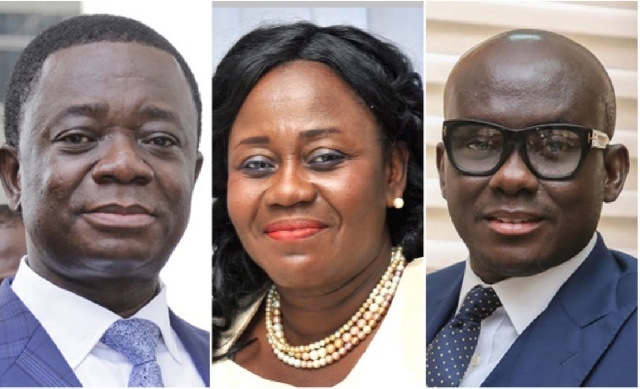Justice Kwasi Anokye Gyimah, the presiding judge on the trial of former COCOBOD CEO, Dr Steven Opuni and businessman Seidu Agongo, is billed to start work today, Monday, 3 July 2023, at his new post in Kumasi, the capital of the Ashanti Region, following his recent transfer.
Dr Opuni, Mr Agongo and his company Agricult Ghana Limited, are facing 27 charges, including willfully causing financial loss to the state and contravention of the Public Procurement Act in the purchase of Lithovit liquid fertiliser between 2014 and 2016.
Justice Gyimah took over the case in March this year and, on 4 April 2023, decided to start the case anew since, in his opinion, the previous proceedings were “replete with applications upon applications” from “both counsel for the accused persons challenging various aspects of the conduct of the proceedings before the previous judge, some of which applications are currently pending before the Supreme Court with another one currently pending before me”.
He said: “The accused persons have time and again complained about the fairness of the trial so far, and that is one of the reasons why they are vehemently opposed to the adoption of proceedings in this matter.”
“The question that I keep asking myself is that even though I may have the discretion to adopt the proceedings in this matter and continue with this trial, with all the allegations, through various applications, of the unfairness of the proceedings before the previous judge, though none have been proven so far, will I be doing justice if I treat it as business-as-usual, adopt the proceedings and continue with the matter as it is?” the Court of Appeal judge wondered.
“If I adopt the proceedings, I am basically adopting every act and decision that has been taken by the previous judge in the matter and I will be saddled with the same suspicions and allegations of unfairness that have been levelled against the current state of the proceedings”, he reasoned.
“I am not by this saying that I agree with the allegations of unfairness that counsel for the accused persons have raised but I am also mindful of the fact that when there are ingrained suspicions as to the fairness or otherwise of a system or procedure, if there is an avenue open to the court that will substantially dispel the said suspicions, it will be the best course for the court to take”, Justice Gyimah pointed out.
He said: “I appreciate the fact that this case has travelled for quite some time and a lot of witnesses have been called and discharged but it is my candid opinion that it will be in the interest of justice and the interest of all the parties for this court to start on a clean slate, free from all the shackles of allegations of unfairness and counter allegations of intentional delays that has bedeviled this case over its duration and that has resulted in the filing of numerous applications before this court, differently constituted, and also before the Supreme Court”.
Justice Gyimah also said section 80(2) (a) of NRCD 323, enjoins the court to assess a witness’ demeanour in determining his/her credibility.
“Much as that may be the right position, in a criminal trial where the liberty of the accused is at stake and where the accused is, by law, presumed innocent and also entitled to a fair trial, any factor, however, minimal or insignificant its effect, that will enhance the opportunities for the fair trial of an accused person should not be overlooked by the court”.
“The drafters of NRCD 323 knew why they placed that provision in the Act and, as a statutory provision, a court that is meant on doing justice in a criminal trial should, as much as is within its power, make sure that the said statutory provision is observed”, he added.
However, the Attorney General argued that the ruling “has occasioned a miscarriage of justice, as it will hinder an efficient trial of the accused persons in the instant case”.
Mr Godfred Dame, thus, prayed the Court of Appeal to quash Justice Gyimah’s de-novo decision.
Mr Dame argued in his application that the high court judge “misdirected himself” in the application of the principles regarding the adoption of evidence in a trial.
He said Justice Gyimah’s decision “has occasioned a miscarriage of justice, as it will hinder an efficient trial of the accused persons in the instant case”.
He, thus, filed an application at the Court of Appeal on Justice Gyimah’s decision.
The Court of Appeal is billed to determine the appeal today, Monday, 3 July 2023.
However, a letter addressed to Justice Gyimah by Chief Justice Gertrude Araba Esaaba Torkornoo, just a few days after being sworn into office on 12June 2023, informed the Court of Appeal judge that he has been transferred to Kumasi and he is to start from today (July 3) – the day the Court of Appeal is set to decide on his de-novo decision.
Justice Gyimah is to be replaced by Justice Aboagye Tandoh of the Winneba High Court.
Justice Tandoh will become the third judge assigned to the five-year-old case whose first judge was now-retired Supreme Court Justice Clemence Honyenuga.
Justice Gyimah holds a Master of Laws (LLM) degree in International Criminal Justice and Armed Conflict from the University of Nottingham in Britain.
He was a law lecturer in the Faculty of Law of the GIMPA where he taught the Law of Immovable Property.
He is a stickler for principles.
It is not clear if the Ghana Bar Association is aware of Justice Gyimah’s transfer and whether it intends making any pu lic comments on it.
The transfer could further add to the controversies that have mired the hearing from Justice Honyenuga’s era, which saw him removed from the case and later reinstated in a legal battle that the defence team insisted had been politicised by the AG.
Source: Daily Mail GH





